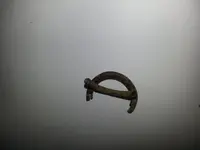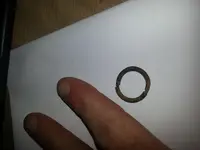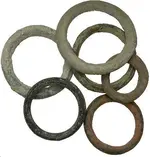Not ring money, Iron age ring money was made of gold and silver only not bronze, people often list bronze one's as ring money they should be banned from ebay. Your item doesn't look old or bronze...sorry.
Julius Caesar gives us the only contemporary account of coinage in Iron Age Britain (1). In his 54 BC. report on military campaigns there, he observes: "For money they use either bronze or gold coins or iron ingots of fixed weights". This mention, tantalizingly brief, does not confirm whether he actually saw the currency he describes. However, finds of both coins and ingots today substantiate Caesar's report.
They often used two colours of metal banded together to form a pattern, some were twisted together and only very rare examples were complete circles.
We now know that the gold rings once considered a form of money all date to the Middle Bronze Age. At such an early date they can hardly have functioned as a form of money. They are now thought to have been used only as personal ornaments. They may, however, also have been used as a means of storing wealth (one of the traditional uses of money).
The gold rings surviving today occur in three varieties, all of them open-ended. The commonest variety is made from a thin, single-strand of twisted gold with plain, tapering ends. The second type, also reasonably common, is thicker and appears to be of twisted silver, with a gold-plating or wash. They have a smooth surface with the ends square-cut. This type occasionally appears with some of the gold worn off, revealing the silver core. The third type, which is extremely rare, is made of two strands of twisted gold soldered together at one point to form a double ring. The strands have plain, tapering ends, much like the first type of ring.
Large bronze rings are known from the Iron Age, and these are sometimes described as ring money. These are probably nothing more than bracelets, and are not likely to have been a form of currency. Smaller examples were probably strap-ends, and the heaviest ones may be spindle-whorls. None are likely to represent any sort of currency.
SS







 This is why today you buy your lover a Gold/Silver Ring... it stems from back then.
This is why today you buy your lover a Gold/Silver Ring... it stems from back then.

